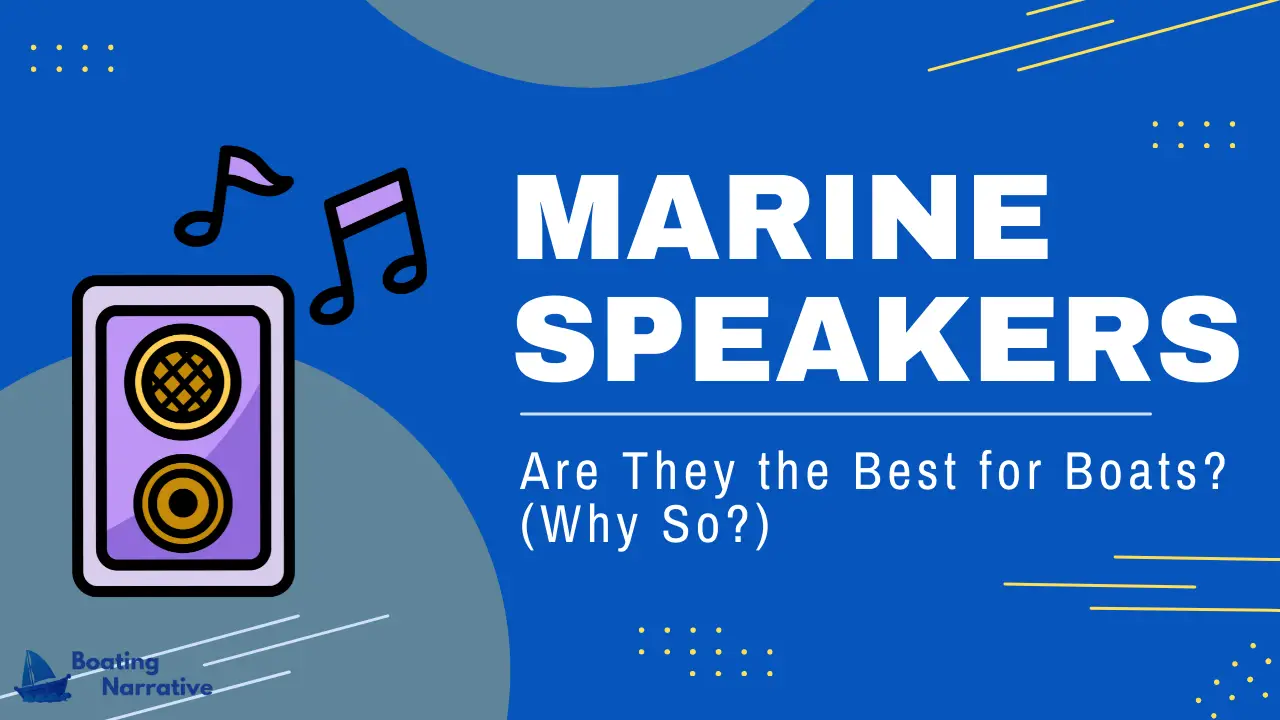Do you want to get your boat ready for the next big adventure? Do you want to be able to navigate your boat and listen to music at the same time?
There are a variety of marine speakers on the market, but not all marine speakers are created equal. Marine speakers are great because they can provide a variety of sound effects while also protected from harsh elements of the sea.
What are marine speakers, exactly? That is the topic of this article, as well as how to choose the one that is best for your boat.
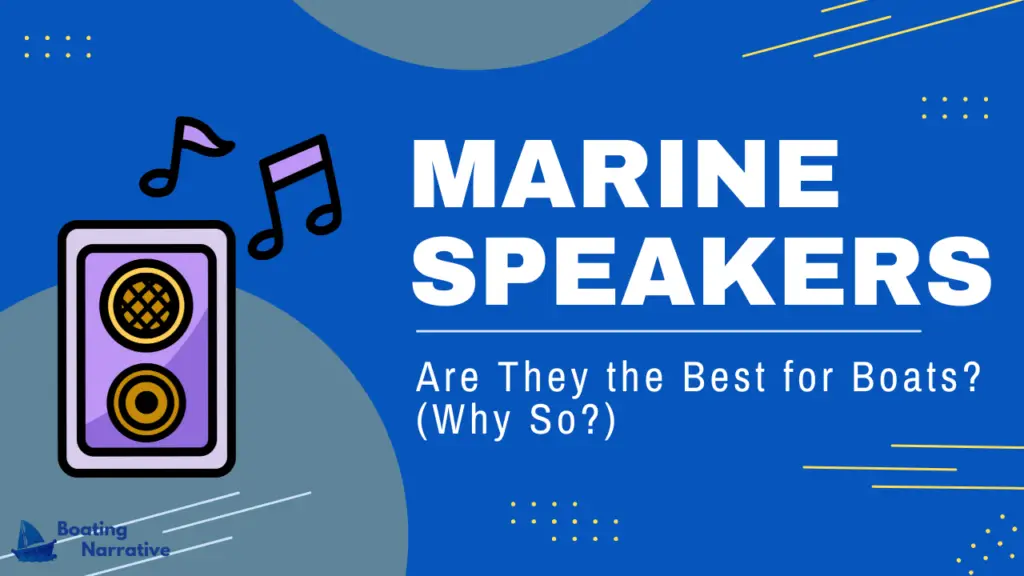
Here’s an Overview of What a Marine Speaker Actually Is:
Choosing the right marine speakers for your boat can be a daunting task. Luckily, marine speakers are designed and manufactured to be used out in the water, so they are built tough to weather the elements.
Marine speakers are a type of speaker designed for use in boats. They are moisture-resistant, meaning they can safely be used near the water. They have the ability to withstand both rain and saltwater conditions yet provide clear sound.
People Say Marine Speakers Are Best for Boats:
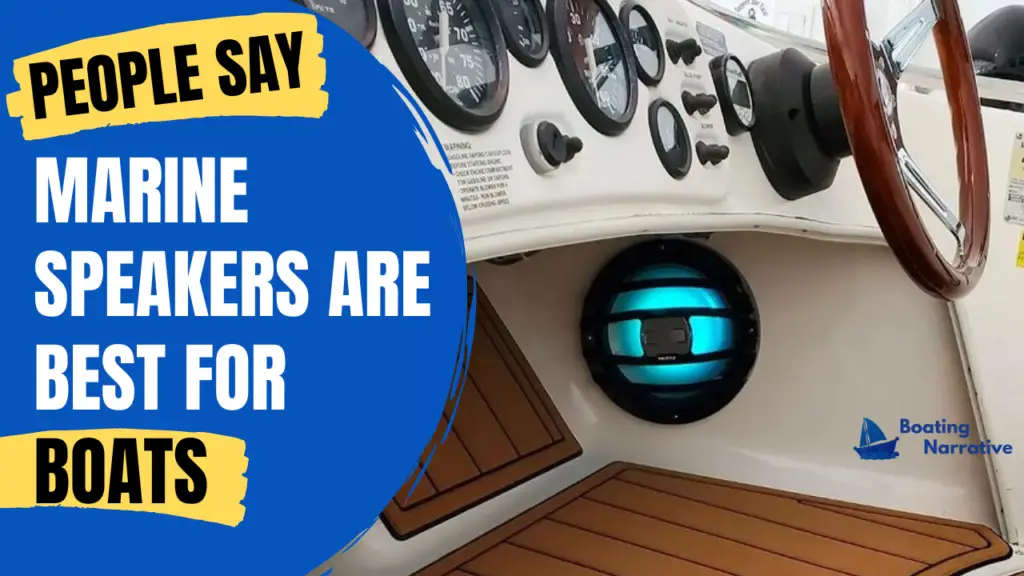
There are many reasons why people say that marine speaker are the best for boats. Some of these reasons include:
- Audio: Marine speakers are designed to provide excellent audio quality even in rough waters.
- Amplifier: A good marine amplifier can provide enough power to the speakers to produce high-quality sound.
- Sound quality: Marine speakers are designed to produce good sound quality even in harsh environments.
- Rust: Marine speakers are designed to resist rust and corrosion.
- Power handling: Marine speakers can handle high power levels without damaging the speaker.
- Corrosion: Marine speakers are designed to resist corrosion from saltwater and other harsh chemicals.
- Water-resistant: Marine speakers are designed to be water-resistant, so they can withstand splashes and spray from the water.
- Setup: Marine speakers are easy to set up, so you don’t need to worry about complex wiring.
- Good sound: Marine speakers produce good sound quality, so you can enjoy your music even while out on the water.
- Wattage: Marine speakers are available in a variety of wattages, so you can choose the right speaker for your needs.
What Is a Marine Speaker?
A marine speaker is a speaker designed for use in a boat. Marine speakers are designed to withstand the harsh conditions of the marine environment, such as saltwater, sun, and wind. Marine speakers are also usually waterproof.
The price of the speaker. Marine speakers range in price from low to high. Choose the price that you are willing to pay. The main features of marine speakers include:
- Waterproof
- Weatherproof
- Salt-resistant
- Sun-resistant
- Wind-resistant
Marine Certified Speaker
Marine certified speakers are a type of audio equipment that is designed to be used in harsh weather conditions and on the water. These speakers are typically made from high-quality materials that are resistant to water and distortion.
Marine speakers are an excellent choice for boat owners who want a durable and high-quality audio system. Fusion marine speakers are designed to withstand the elements and provide clear, powerful sound. These speakers come with a built-in amplifier and terminals that make installation easy.
The Cons of A Marine Speaker
There are a few disadvantages to marine speakers. One is that they can be more expensive than regular speakers. Another is that they may not sound as good as regular speakers. Things to consider:
- They can be expensive.
- They require more power than traditional speakers, so your boat’s battery may drain more quickly.
- They are not as loud as traditional speakers, so you may not be able to hear them as well when you’re out on the water.
- They can be challenging to clean or repair when damaged by salt water and sun exposure, so you’ll need to take care of them to ensure they last.
Who Will Use Marine Speakers?
Marine speakers are designed for people who love spending time on the water. Whether you’re a recreational boater or a professional fisherman, you’ll appreciate the quality sound that marine speakers provide.
Marine speakers on boats are made to endure the elements, so you don’t have to worry about them rusting or being damaged by the sun. They’re also waterproof, so you can enjoy your music even if it rains.
If you’re looking for a technique to boost your time on the water, marine speakers are a great option. They’ll help you relax and enjoy the scenery, and you’ll love the quality sound that they provide.
Choosing The Right Marine Speaker
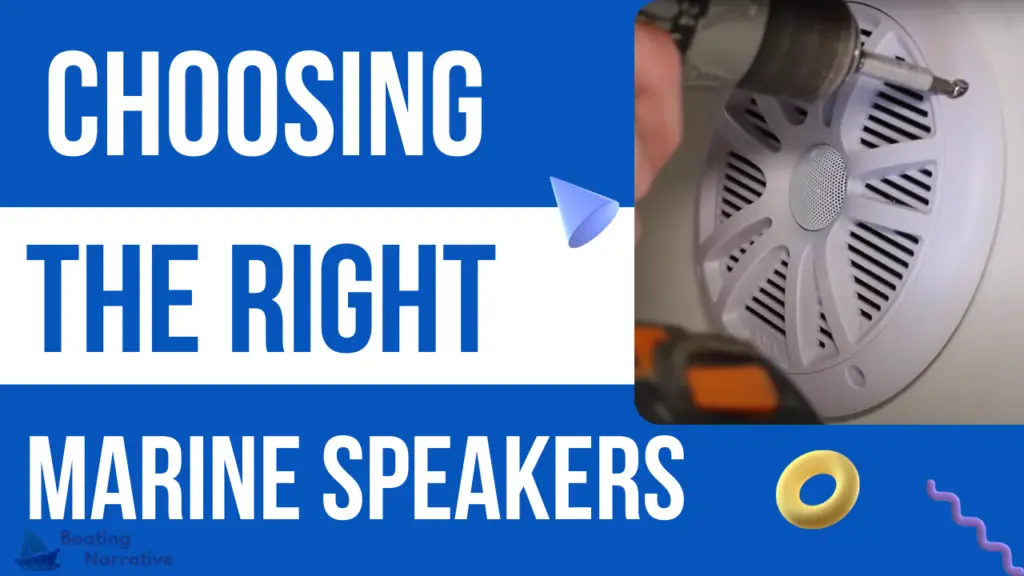
When choosing marine speakers, it is crucial to consider the following factors:
- The size of the speaker. Marine speakers are available in a range of sizes, so it is vital to choose one that will fit in the available area on your boat.
- The power of the speaker. You will want to make sure that the speaker you choose can handle the power output of your stereo system.
- The type of speaker. Marine speakers are divided into two categories: coaxial and component. Coaxial speakers are easier to install, but component speakers will provide better sound quality.
- The price. Marine speakers can range in price from a few hundred dollars to a few thousand dollars. Setting a budget is critical before you start shopping so you can narrow down your options.
Can Marine Speakers Get Wet?
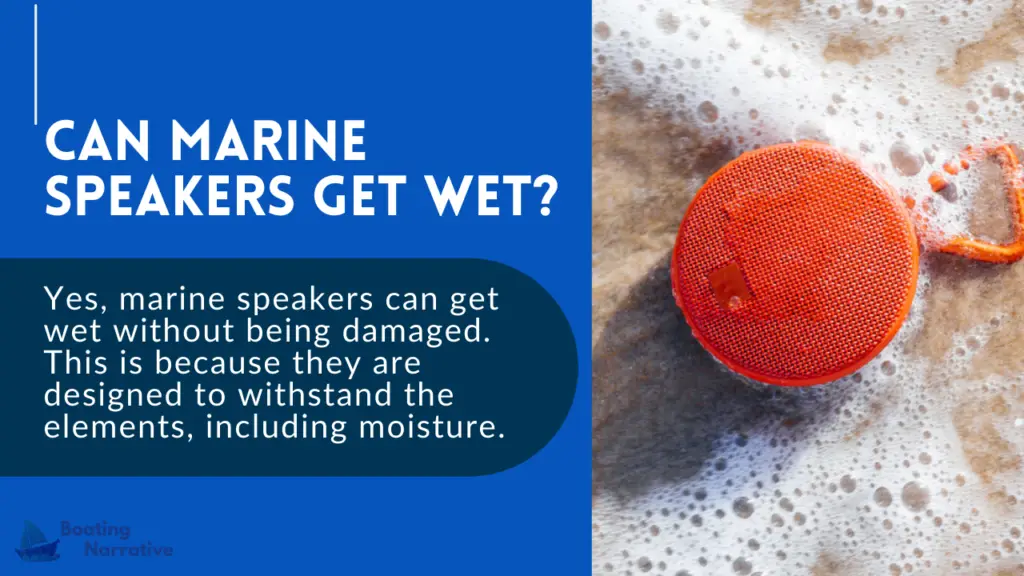
Yes, marine speakers can get wet without being damaged. This is because they are designed to withstand the elements, including moisture. Marine speakers are typically made with waterproof materials and have sealed internals to prevent water damage.
Most marine speakers are made to withstand the elements, including moisture. However, it is still important to check the specifications of your particular model to be sure. Marine speakers typically have a higher wattage than regular speakers, which means they can handle more power.
They also have a higher cone and grille density to withstand the elements. The peak power is the measure of the maximum power that the speaker can handle for a short period of time.
Marine Speakers and Enclosure
Most marine speakers need some type of enclosure in order to function properly. Enclosures help to protect the speakers from the elements and keep the sound quality high. Many marine speakers are enclosed in a stainless steel or aluminum casing.
They are typically made from durable materials that are resistant to water and salt damage. Many marine speakers also feature magnets that are coated with polypropylene material to resist corrosion.
Can You Use a Marine Stereo in A Road Vehicle?
Marine speakers are a set of speakers designed specifically for use in boats. They are typically made from weather-resistant materials and are designed to withstand the elements. Marine speakers usually have a higher wattage than regular speakers, which means they can produce louder, fuller sounds.
- Most marine stereos will work fine in a road vehicle.
- However, you may need to purchase an adapter to connect the stereo to the vehicle’s electrical system.
- Marine stereos typically have a higher wattage than car stereos, so you may need to purchase an amplifier to get the full range of sound.
Why Do They Need to Be Sturdy?
Marine speakers need to be sturdy in order to withstand the harsh conditions of being on a boat. They are exposed to sun, rain, saltwater, and wind. This can take a toll on regular speakers, causing them to degrade quickly.
Marine speakers are made to withstand these conditions and last longer. Some features that make marine speakers more durable than regular speakers are:
- they are made of UV resistant materials
- they have a water-resistant coating
- they are designed to withstand high humidity
- they have a larger diameter
If you are looking for a good set of marine speakers, make sure to check for these features.
Can Marine Grade Speakers Be Submerged?
Most marine-grade speakers are designed to withstand being submerged in water for short periods of time. However, it is always best to consult the manufacturer’s instructions to be sure.
Best Way to Mount Speakers on A Boat
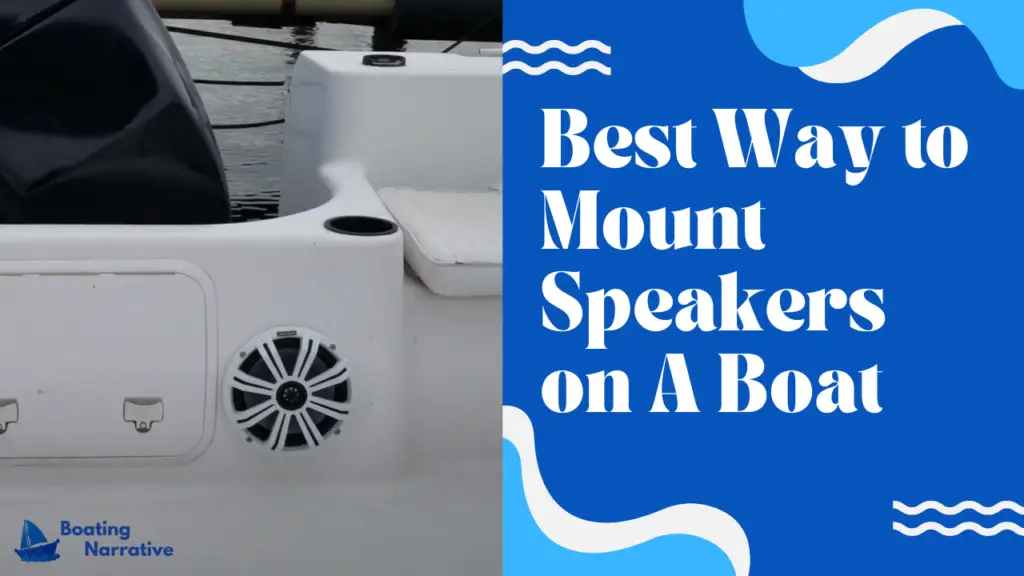
There are several ways to mount speakers on a boat. The most common method is to mount the speakers on the gunwales or on the side of the boat. Another option is to mount the speakers on the deck. If the boat has a hardtop, the speakers can be mounted on the hardtop. If the boat has a T-top, the speakers can be mounted on the T-top.
The speakers can also be mounted on the transom, on the stern, or on the bow. When choosing a location for the speakers, it is important to consider how the sound will be distributed. For example, if the speakers are mounted on the side of the boat, the sound will be directed towards the side of the boat.
If the speakers are mounted on the deck, the sound will be directed towards the center of the boat. It is also important to consider the angle of the speaker.
Final Thoughts
Marine speakers are designed to withstand the harsh conditions of the open water. They are usually encased in a waterproof and UV-resistant material to protect them from the sun and saltwater. Marine speakers can be mounted on the deck of a boat or on the hull. Some people even mount them on their Jet Skis or WaveRunners.
There are several brands of marine speakers on the market, and they come in a variety of styles and sizes. Prices can range from a few hundred dollars to several thousand dollars.
There are several things to consider when choosing marine speakers. The first is the size of the speaker. Marine speakers come in a variety of sizes, from small to large. The size of the speaker will determine how much power it can handle and how loud it can get.
The second thing to consider is the type of speaker. Marine speakers can be either coaxial or component. Coaxial speakers are easier to install but are not as high quality as component speakers. Component speakers are more expensive but offer better sound quality.
The third thing to consider is the wattage of the speaker. The wattage will determine how loud the speaker can get. A higher wattage speaker will be louder than a lower wattage speaker.
The fourth thing to consider is the sensitivity of the speaker. The sensitivity will determine how well the speaker can reproduce low frequencies. A higher sensitivity speaker will be better at reproducing low frequencies than a lower sensitivity speaker.

